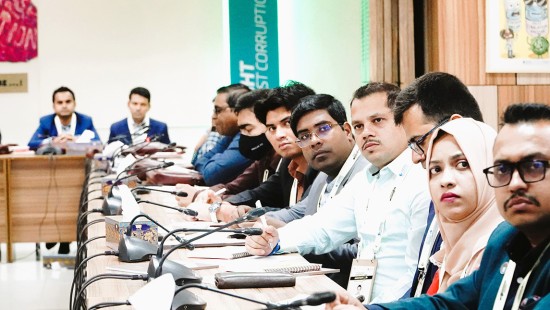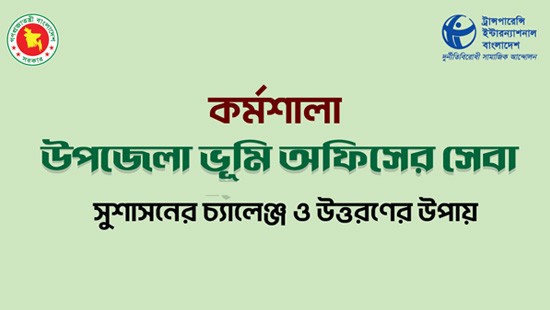Published: 22 October 2024
"To boost reliability and efficiency of solar-powered renewable energy, it is imperative to improve solar panel performance." This goal drove Salman Hossain and Al Mumtahina Arika's ‘Sustainability Sparks’ from Islamic University of Technology to utilize machine learning for optimising dust collection in solar panel cleaning system - which ultimately won them country’s first ever Youth IDEA Contest on Renewable Energy 2024 hosted by Transparency International Bangladesh (TIB).
Another innovative idea of solar-powered rural cold storage system was pitched by Sawda Muntaha and Ishraq Tayeem Reja, 1st Runner-Ups from Team ‘Green Cooler’, of the same university. The system, smartly coupled to a solar hybrid electric vehicle (SHEV), preserves fresh food and uses solar energy for delivery and storage fulfilling their goal to improve food security in areas without reliable power.
TIB hosted the Idea Contest 2024 to inspire young people to find renewable energy solutions seeking to promote policy clarity and renewable energy innovation. A total of 84 concepts from 89 public and private university teams were submitted for the pioneering competition, and 30 finalists attended a three-day residential program at the CCDB Hope Centre in Ashulia, Savar, from October 17 to 19. These extraordinary initiatives reflect students' passion and commitment to improving the world rather than just technology. They showcased ground-breaking renewable energy solutions, proving that a sustainable future is conceivable.
Aligned with the expected outcomes of the contest, Team Energy-Ferry, presented a dual energy harvesting solution for electric three-wheelers. “We want Bangladeshi E3W charging changed. Sustainable infrastructure is crucial for Bangladesh's growing clean transportation needs”, said Sayeed Hossain Sayor who led the 2nd Runner-Ups. Building solar parks along rivers to power mobile battery stations and lessen grid dependence was their innovative idea.
Acknowledging such out-of-the-box ideas submitted for the contest, TIB Coordinator of Energy Governance Md. Newazul Moula inaugurated the contest. He highlighted the need for innovative solutions and stakeholder engagement in renewable energy. Two sessions followed the inauguration. The first session, titled "Good Governance in Bangladesh's Energy Sector: Pathways to Solutions," was led by Senior Research Fellow of TIB Md. Mahfuzul Haque, while the second, "Global Context and Bangladesh's Power and Energy Sector: The Necessity of Renewable Energy," presented by Hasan Mehedi, CEO of CLEAN (Coastal Livelihood and Environmental Action Network). During these sessions, industry professionals like Md. Abdullah Al Mamun from SREDA and Golam Iftekhar Mahmud from The Daily Prothom Alo gave input on prototype presentations.
Resource persons led workshops on October 18 to refine participants' ideas and improve their grasp of project planning in Bangladesh's renewable energy industry. Project success depended on economic feasibility, business modeling, environmental factors, and governance. TIB’s Director of Research and Policy Division, Muhammad Badiuzzaman, stressed cost-effectiveness and economic benefits, while the Director of Outreach and Communication, Mohammad Tauhidul Islam, emphasised on strong business model. The evening concluded with a gala night, fostering connections among participants, mentors, and industry leaders.
A.K. Enamul Haque, a distinguished economist and Professor in the Department of Economics at East West University; Mehrin Ahmed Mahbub, Senior External Affairs Officer at the World Bank; Ratan Kumar Ghosh, Member of Energy Efficiency & Conservation at the Sustainable and Renewable Energy Development Authority (SREDA); Hasan Mehedi, a well-known researcher, and Dipal Chandra Barua, a trailblazer in the advancement of private sector renewable energy judged the contest on October 19. Innovative renewable energy solutions included converting waste into energy, proposing policy reforms with a 2050 roadmap, developing a portable solar-powered cold storage and transport system to preserve freshness, converting municipal organic waste into biofuel, and implementing dual energy harvesting to synergize wind and wave energy for power generation.
One unique thing about the event was a time for free speech and networking. People talked about fossil fuel problems and shared their points of view, and the event chose three winners from this time. Then TIB's ED spoke, and everyone took an oath while he led them. In a heartfelt address, Dr. Iftekharuzzaman emphasized that all competitors are winners for their commitment to idea development and innovation. He also talked about how important it is for young people to lead social change, especially in the area of renewable energy. He promised that TIB would always back them because he thinks they can lead groundbreaking projects for the public good in the future.
The Youth Idea Contest not only ignited a spirit of collaboration and creativity among young change-makers but also reinforced the idea that a sustainable future is attainable. By transforming challenges into opportunities, these visionary teams are indeed paving the way for a brighter, solar-powered future in Bangladesh.

























